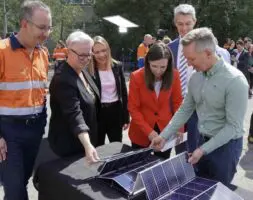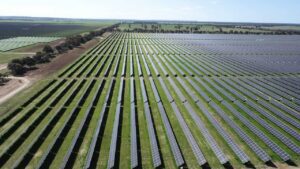After nearly two weeks of tense discussion, attendees at the Bonn climate talks have settled their final agenda, the set of issues that will be decided upon at the UNFCCC’s COP28 meeting in Dubai in December.
That agenda was settled without any explicit mention of how countries will finance global mitigation, a divisive issue at this year’s meeting.
“Essentially, it was a fudge that allows the process to go ahead but without addressing the underlying problems that are holding up real climate action on the ground and climate negotiations at the UN,” said Teresa Anderson, Global Lead on Climate Justice at ActionAid International, at a press conference on Thursday.
“This week, UN climate talks exposed a gaping hole in the funding needed to pay for climate action.”
“On the technical level, there has been a lot of work,” said Harjeet Singh, head of global political strategy at Climate Action Network International. “But when it comes to real climate action, delivering finance, even [a rating of] 1 out of 5 would be an overstatement.”
The thorny issue of finance is possibly the biggest roadblock to achieving emissions reductions in time to reach Net Zero. In particular, developing nations want to know how developed nations (who have contributed the vast bulk of historic emissions) will help them pay for emissions reductions and climate mitigation and adaptation.
“Most people probably think about climate negotiations as a space where we talk about carbon dioxide, renewable energy, coping with climate impacts,” said Anderson.
“But actually, the Paris Agreement was at its heart a deal on finance so that communities being hit by climate change could get the support they need, and so that lower income countries can really be part of the transition.”
At a press conference last week, Singh warned that the current set-up for poorer countries to fund their emissions mitigation targets were patently unfit for purpose. Anderson agrees, and says no progress has been made since then.
“The cracks are really showing, developing countries are being pushed deeper into debt by the cost of climate disasters, but the promised funding to cope with climate impacts, scale up green technologies and bring about a just transition from fossil fuels still hasn’t appeared in rich countries.”
Anderson said these concerns explained why talks were struggling on.
“It’s not surprising that developing countries are actually reluctant to negotiate further commitments if they suspect that they won’t get the funding to deliver them,” she said. “After all these years of broken promises, developing countries no longer want to take that leap of faith.”
Many of the issues discussed at Bonn depend upon – and collapse without – the promise of adequate funding.
Those issues include mitigation finance, adaptation finance, and where the cash will come from for the Loss and Damage Fund promised at COP27 in Egypt, a fund that would allow developed countries to provide funding for developing countries experiencing climate-related natural disasters.
Experts have criticised suggestions from richer countries to provide that finance in the form of loans.
“93 per cent of climate vulnerable countries are in or at risk of debt distress,” says Anderson. “So offering loans branded as climate finance is just going to make that problem worse.”
There was a small note of optimism at the conference, with Green Peace MENA regional campaigns lead Shady Khalil pointing out that the COP28 presidency, composed of leaders from the UAE – a nation that has made its fortune off oil – formally acknowledged that the decline of fossil fuels is inevitable.
“Although the vision of COP28 from the presidency still falls short of the necessary ambition and urgency required to address the climate crisis, it sends a powerful signal to the rest of the world, and in particular to fellow oil and gas producing nations,” Khalil said.
The COP28 presidency has faced controversy over the appointment of oil boss Sultan Ahmed Al Jaber as president-designate. Al Jaber is also chairman of Masdar, a UAE government-owned renewable energy company.
Al Jaber has previously said that a “business mindset” is needed to tackle the climate crisis.
“We need a major course correction and a massive effort to reignite progress. This cannot be done by governments alone,” Al Jaber told the Guardian in a rare interview in April.
“The scale of the problem requires everyone working in solidarity. We need partnerships, not polarisation, and we need to approach this with a clear-eyed rationale and executable plan of action.”










